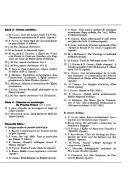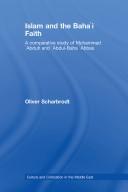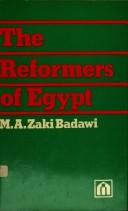| Listing 1 - 8 of 8 |
Sort by
|
Book
ISBN: 9781838607302 1838607307 9781838607333 9781838607326 Year: 2022 Publisher: London I.B. Tauris
Abstract | Keywords | Export | Availability | Bookmark
 Loading...
Loading...Choose an application
- Reference Manager
- EndNote
- RefWorks (Direct export to RefWorks)
''How to approach the complex intellectual legacy of a modern Muslim thinker like Muhammad 'Abduh (1849-1905)? This book offers an answer to this question by providing a new complete intellectual biography of him. It delineates 'Abduh's formation as a reformer and activist and embeds his varied intellectual contributions in a culture of ambiguity which has marked the intellectual life of Muslim societies throughout their history.By using new sources – in particular his early mystical, philosophical and political writings – and including recent academic contributions on him, the book explores 'Abduh's complex intellectual formation, the various religious, philosophical and cultural influences that shaped him, and his changing attitudes towards “Western modernity” and its colonial manifestation in the 19th century. Oliver Scharbrodt challenges the perception in academic scholarship - and among Muslim reformers of the 20th century - that searched for intellectual coherence and biographical consistency in 'Abduh's life. Instead, this book offers a new more comprehensive reading of his intellectual legacy and highlights the variety of approaches and ideas manifest in his contributions.''
Islamic modernism --- Islam and culture --- Muḥammad ʻAbduh
Book
ISBN: 9782351590294 2351590295 Year: 2006 Publisher: Damas : Institut français du Proche-Orient : Direction scientifique des études médiévales, modernes et arabes,
Abstract | Keywords | Export | Availability | Bookmark
 Loading...
Loading...Choose an application
- Reference Manager
- EndNote
- RefWorks (Direct export to RefWorks)
Islam --- History --- Histoire --- Islamic modernism --- MuḸammad ʻAbduh, --- Muḥammad ʻAbduh, --- Islamic modernism - Congresses --- MuḸammad ʻAbduh, - 1849-1905 - Congresses --- Muḥammad ʻAbduh, - 1849-1905 --- MuḸammad ʻAbduh, - 1849-1905

ISBN: 2721460099 9782721460097 Year: 1996 Publisher: Beyrouth: Dar el-Machreq,
Abstract | Keywords | Export | Availability | Bookmark
 Loading...
Loading...Choose an application
- Reference Manager
- EndNote
- RefWorks (Direct export to RefWorks)
Book
ISBN: 9789004398351 Year: 2019 Publisher: Leiden ; Boston : Brill,
Abstract | Keywords | Export | Availability | Bookmark
 Loading...
Loading...Choose an application
- Reference Manager
- EndNote
- RefWorks (Direct export to RefWorks)
"In Muhammad 'Abduh and his Interlocutors: Conceptualizing Religion in a Globalizing World, Ammeke Kateman offers an account of Muhammad 'Abduh's Islamic Reformism in a context in which ideas increasingly crossed familiar geographical, religious and cultural frontiers. Presenting an alternative to the inadequate perspective of "Westernization", Kateman situates the ideas of Muhammad 'Abduh (Egypt, 1849-1905) on Islam and religion amongst those of his interlocutors within a global intellectual field. Ammeke Kateman's approach documents the surprising pluralism of 'Abduh's interlocutors, the diversity in their shared conceptualizations of religion and the creativity of 'Abduh's own interpretation. In this way, the conceptualizations of 'Abduh and his contemporaries also shed light on the diversified global genealogy of the modern concept of religion"--
Islamic philosophy. --- Globalization --- Religion --- Religious aspects --- Islam --- Islam. --- Philosophy. --- Muḥammad ʻAbduh, --- Hanotaux, Gabriel,
Book
ISBN: 9004398384 900439835X Year: 2019 Publisher: Leiden ; Boston : Brill,
Abstract | Keywords | Export | Availability | Bookmark
 Loading...
Loading...Choose an application
- Reference Manager
- EndNote
- RefWorks (Direct export to RefWorks)
In Muḥammad ʿAbduh and his Interlocutors: Conceptualizing Religion in a Globalizing World , Ammeke Kateman offers an account of Muḥammad ʿAbduh’s Islamic Reformism in a context in which ideas increasingly crossed familiar geographical, religious and cultural frontiers. Presenting an alternative to the inadequate perspective of “Westernization”, Kateman situates the ideas of Muḥammad ʿAbduh (Egypt, 1849-1905) on Islam and religion amongst those of his interlocutors within a global intellectual field. Ammeke Kateman’s approach documents the surprising pluralism of ʿAbduh’s interlocutors, the diversity in their shared conceptualizations of religion and the creativity of ʿAbduh’s own interpretation. In this way, the conceptualizations of ʿAbduh and his contemporaries also shed light on the diversified global genealogy of the modern concept of religion.
Islamic philosophy. --- Globalization --- Arabic philosophy --- Muslim philosophy --- Philosophy, Islamic --- Philosophy, Arab --- Religious aspects. --- Muḥammad ʻAbduh, --- ʻAbduh, Muḥammad, --- Mu-han-mo-te A-pu-tu, --- Abdo, Mohammad, --- Mohammad Abdo, --- Mehmet Abduh, --- عبده، محمد --- عبده، محمد، --- محمد عابدة --- محمد عبدة --- محمد عبده --- محمد عبده، --- محمد عبده, --- ʻAbduh, Muḥammad --- Mu-han-mo-te A-pu-tu --- Abdo, Mohammad --- Mohammad Abdo --- Mehmet Abduh

ISBN: 9780203928578 0203928571 9780415774413 0415774411 1281314102 9781281314109 9786611314101 6611314105 113597568X 9781135975630 9781135975678 9781135975685 9780415664035 1135975671 Year: 2008 Publisher: New York, NY Routledge
Abstract | Keywords | Export | Availability | Bookmark
 Loading...
Loading...Choose an application
- Reference Manager
- EndNote
- RefWorks (Direct export to RefWorks)
This book explores the development of Islam and the Baha'i faith in the nineteenth century via the examination of two key reformers.
Bahai Faith --- Islam --- Islamic renewal. --- Islamic reform --- Islamic revivalism --- Islamic revivalist movement --- Ṣaḥwah (Islam) --- Religious awakening --- Wahhābīyah --- Mohammedanism --- Muhammadanism --- Muslimism --- Mussulmanism --- Religions --- Muslims --- Bahaism --- Babism --- Relations --- Islam. --- Bahai Faith. --- Reform --- Renewal --- ʻAbduʼl-Bahá, --- Muḥammad ʻAbduh, --- ʻAbduh, Muḥammad, --- Mu-han-mo-te A-pu-tu, --- Abdo, Mohammad, --- Mohammad Abdo, --- Mehmet Abduh, --- عبده، محمد --- عبده، محمد، --- محمد عابدة --- محمد عبدة --- محمد عبده --- محمد عبده، --- محمد عبده, --- ʻAbbās, ʻAbdulbahāʼ, --- ʻAbbās Effendi, --- Abd al-Bahā ibn Bahā Allāh, --- ʻAbd ul-Bahā ibn Bahā Ullāh, --- Abdul Bĕkha, --- ʻAbdulbahāʼ, --- ʻAbdulbahāʼ ʻAbbās, --- Abudul-Baha Abbas, --- Bĕkha, Abdul, --- عبد البها --- عبد البهاء --- ʻAbd al-Bahāʼ, --- Geschichte 1850-1925 --- ʻAbduh, Muḥammad --- Mu-han-mo-te A-pu-tu --- Abdo, Mohammad --- Mohammad Abdo --- Mehmet Abduh --- the Baha'i faith --- Muhammad 'Abduh --- 'Abdul-Baha 'Abbas --- mysticism --- millenarianism --- modernity --- charisma --- orthodoxy --- Abdul-Baha, --- Muhammad Abduh,
Book
ISBN: 0804769753 9780804769754 9780804752503 9780804778602 0804752508 0804778604 Year: 2009 Publisher: Stanford, Calif. : Stanford University Press,
Abstract | Keywords | Export | Availability | Bookmark
 Loading...
Loading...Choose an application
- Reference Manager
- EndNote
- RefWorks (Direct export to RefWorks)
Samira Haj conceptualizes Islam through a close reading of the writings of Muhammad ibn 'Abdul Wahhab (1703-87) and Muhammad 'Abduh (1849-1905)-each of whom is representative of a distinct trend, chronologically as well as philosophically, in the constitution of modern Islam.
Islamic modernism. --- Islamic renewal. --- Islam and reason. --- Islamic philosophy --- Islam --- Islamic reform --- Islamic revivalism --- Islamic revivalist movement --- Ṣaḥwah (Islam) --- Religious awakening --- Wahhābīyah --- Modernism, Islamic --- History. --- Reform --- Renewal --- Muḥammad ibn ʻAbd al-Wahhāb, --- Muḥammad ʻAbduh, --- ʻAbduh, Muḥammad, --- Mu-han-mo-te A-pu-tu, --- Abdo, Mohammad, --- Mohammad Abdo, --- Mehmet Abduh, --- عبده، محمد --- عبده، محمد، --- محمد عابدة --- محمد عبدة --- محمد عبده --- محمد عبده، --- محمد عبده, --- Abdul Wahāb, Muḥammad bin, --- ʻAbdulvahhāb, Muḥammad bin, --- Ibn ʻAbd al-Wahhāb, Muḥammad, --- Ibn Abdel Wahhab, Muhammad, --- Muḥammad bin ʻAbdul Wahāb, --- Muḥammad bin ʻAbdulvahhāb, --- Muḣammad ibn ʻAbd al-Wahhāb al-Najdī, --- Muhammad ibn Abdel Wahhab, --- Muḧemmedê kur̄ê ʻEbdilwehhabî, --- Najdī, Muḣammad ibn ʻAbd al-Wahhāb, --- Tamīmī, Muḥammad ibn ʻAbd al-Wahhāb, --- Muḥammad bin ʻAbdulvahāb, --- تميمي، محمد بن عبد الوهاب --- محمد ابن عبد الوهاب --- محمد بن عبد الوهاب النجدي --- محمد بن عبد الوهاب ، --- محمد بن عبد الوهاب، --- محمّد بن عبدالوهاب، --- Muhammad ibn Abdul-Wahhab, --- Muḥammad ibn ʻAbd al-Vahhāb Qazvīnī, --- محمد بن عبد الوهاب قزوينى --- Qazvīnī, Muḥammad ibn ʻAbd al-Vahhāb, --- قزوينى، محمد بن عبد الوهاب --- Mírzá Muḥammad, --- Islamic modernism --- Islamic renewal --- Faith and reason --- History --- Muḥammad ibn ʻAbd al-Wahhāb, --- ʻAbduh, Muḥammad --- Mu-han-mo-te A-pu-tu --- Abdo, Mohammad --- Mohammad Abdo --- Mehmet Abduh --- Faith and reason - Islam --- Islamic philosophy - History --- Muḥammad ibn ʻAbd al-Wahhāb, - 1703 or 1704-1792 --- Muḥammad ʻAbduh, - 1849-1905 --- Islam. --- Muhammad ibn Abd al-Wahhab, --- Muhammad Abduh,

ISBN: 0856646512 Year: 1978 Publisher: London Croom Helm
Abstract | Keywords | Export | Availability | Bookmark
 Loading...
Loading...Choose an application
- Reference Manager
- EndNote
- RefWorks (Direct export to RefWorks)
Muslims --- -Mohammedans --- Moors (People) --- Moslems --- Muhammadans --- Musalmans --- Mussalmans --- Mussulmans --- Mussulmen --- Religious adherents --- Islam --- Biography --- Afghani, Jamal al-Din --- History. --- Biography. --- Afghānī, Jamāl al-Dīn, --- Muḥammad ʻAbduh, --- Muḥammad Rashīd Riḍā. --- -Biography --- History --- Muḥammad ʻAbduh, --- Muḥammad Rashīd Riḍā. --- Afghānī, Jamāl al-Dīn, --- Jamāl al-Dīn al-Ḥusainī al-Afghānī, --- Jamāl al-Dīn al-Afghāni, --- Camāladdīn al-Afġānī, --- Afġānī, Ǧamāladdīn, --- Jāmāluddīn Afghānī, --- Djamal-ed-Din Assad Abadi, --- Ḥusaynī, Jamāl al-Dīn, --- Asadābādī, Jamāl al-Dīn, --- Afgani, Cemaleddin, --- Afghānī, Sayyid Jamāl al-Dīn, --- al-Ḥusaynī al-Afghānī, Sayyid Jamāl al-Dīn, --- al-Ḥusaynī al-Afghānī, Jamāl al-Dīn, --- Ḥusaynī al-Afghānī, Sayyid Jamāl al-Dīn, --- Ḥusaynī al-Afghānī, Jamāl al-Dīn, --- al-Afghānī, Sayyid Jamāl al-Dīn al-Ḥusaynī, --- Cemaledînî Efẍanî, --- Efẍanî, Cemaledîn, --- Asadābādī, Sayyid Jamāl al-Dīn, --- Jamāl al-Dīn Asadābādī, --- أفغانى، جمال الدين، --- أفغاني، جمال الدين --- أفغاني، جمال الدين، --- افغاني، جمال الدين، --- الافغاني، جمال الدين، --- افغانى، جمال الدين، --- Abu Abd Allah --- Abu Muhammad Syafi'i --- al-Syekh al-Sayyid Muhammad Rasyid Rida --- Mohamed Rachid Rida --- Muḥammad Rashīd ibn ʻAlī Riḍa al-Ḥusainī --- Muhammad Rasjid Rida --- Muhammed Reşid Rıza el-Hüseyni --- Rashīd Riḍā, Muḥammad --- Rasjid Rida, Muhammad --- Rasyid Rida --- Reşid Rıza --- Riḍā, al-Sayyid Muḥammad Rashīd --- Riḍā, Muḥammad Rashīd --- Riḍā, Rashīd --- Ridha, Muhammad Rasjid --- رشيد رضا، محمد --- رضا، السيد محمد رشيد --- رضا، محمد رشيد --- محمد رشيد رضا --- ʻAbduh, Muḥammad, --- Mu-han-mo-te A-pu-tu, --- Abdo, Mohammad, --- Mohammad Abdo, --- Mehmet Abduh, --- عبده، محمد --- عبده، محمد، --- محمد عابدة --- محمد عبدة --- محمد عبده --- محمد عبده، --- محمد عبده, --- ʻAbduh, Muḥammad --- Mu-han-mo-te A-pu-tu --- Abdo, Mohammad --- Mohammad Abdo --- Mehmet Abduh --- Džemāludīn el-Afgānī, --- El-Afgānī, Džemāludīn, --- Džemāluddīn el-Afgānī, --- El-Afgānī, Džemāluddīn,
| Listing 1 - 8 of 8 |
Sort by
|

 Search
Search Feedback
Feedback About UniCat
About UniCat  Help
Help News
News